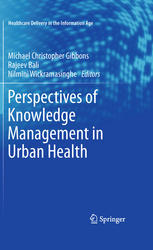

Most ebook files are in PDF format, so you can easily read them using various software such as Foxit Reader or directly on the Google Chrome browser.
Some ebook files are released by publishers in other formats such as .awz, .mobi, .epub, .fb2, etc. You may need to install specific software to read these formats on mobile/PC, such as Calibre.
Please read the tutorial at this link: https://ebookbell.com/faq
We offer FREE conversion to the popular formats you request; however, this may take some time. Therefore, right after payment, please email us, and we will try to provide the service as quickly as possible.
For some exceptional file formats or broken links (if any), please refrain from opening any disputes. Instead, email us first, and we will try to assist within a maximum of 6 hours.
EbookBell Team

4.7
76 reviewsUrban Health Knowledge Management Michael Christopher Gibbons, Rajeev K. Bali, and Nilmini Wickramasinghe It is a tragic paradox of American health care: a system renowned for world-class doctors, the latest medical technologies, and miraculous treatments has shocking inadequacies when it comes to the health of the urban poor. Urban Health Knowledge Management outlines bold, workable strategies for addressing this disparity and eliminating the “knowledge islands” that so often disrupt effective service delivery. The book offers a wide-reaching global framework for organizational competence leading to improved care quality and outcomes for traditionally underserved clients in diverse, challenging settings. Its contributors understand the issues fluently, imparting both macro and micro concepts of KM with clear rationales and real-world examples as they: • Analyze key aspects of KM and explains their applicability to urban health. • Introduce the KM tools and technologies most relevant to health care delivery. • Offer evidence of the role of KM in improving clinical efficacy and executive decision-making. • Provide extended case examples of KM-based programs used in Washington, D.C. (child health), South Africa (HIV/AIDS), and Australia (health inequities). • Apply KM principles to urban health needs in developing countries. • Discuss new approaches to managing, evaluating, and improving delivery systems in the book’s “Measures and Metrics” section. Urban health professionals, as well as health care executives and administrators, will find Urban Health Knowledge Management a significant resource for bringing service delivery up to speed at a time of great advancement and change.